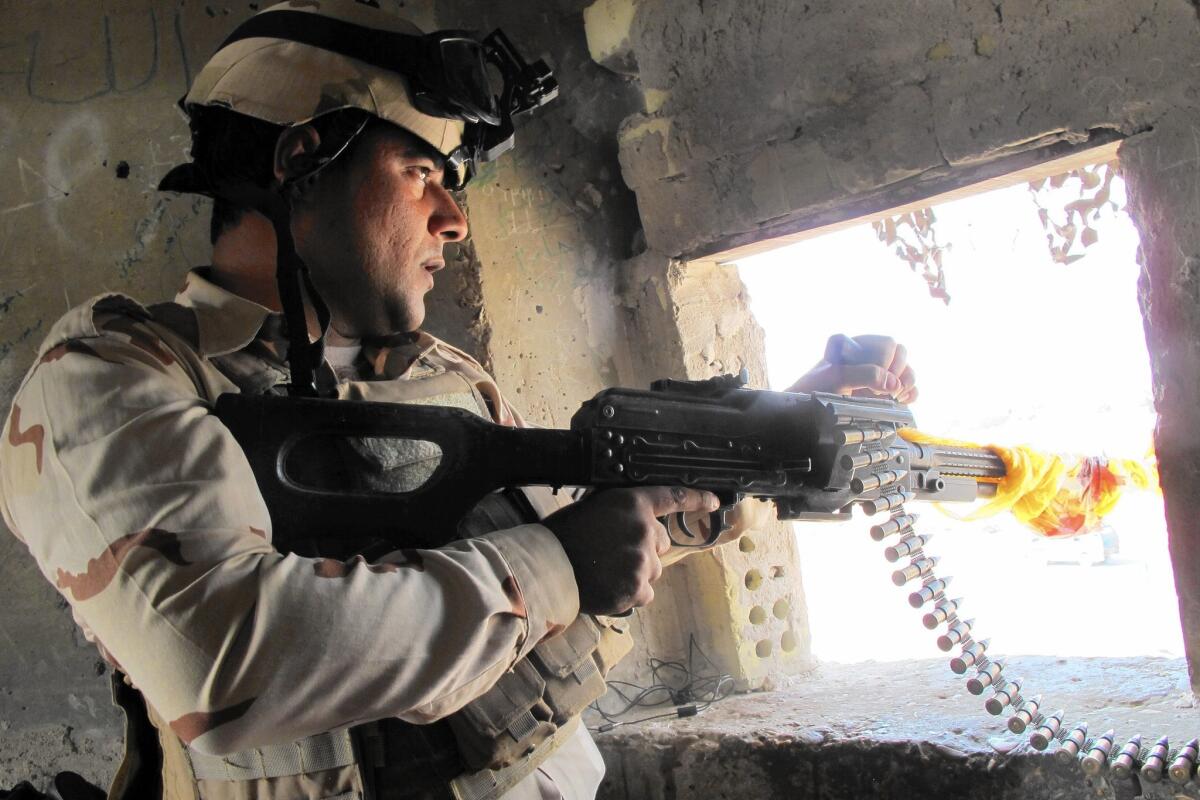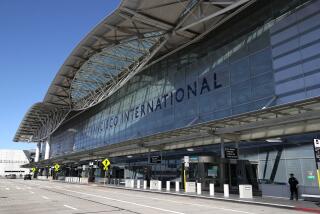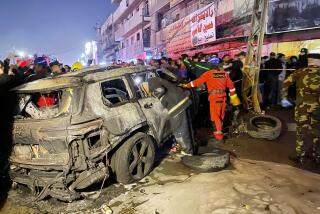Iraqi forces insist Baghdad airport, lifeline to the world, is secure

Sgt. Ahmed Hassan says he hasn’t fired a shot at Islamic State fighters in six weeks. From his perch atop an Iraqi army guard tower in this ramshackle city just west of Baghdad, he peers over his rifle sight toward a military checkpoint clogged with traffic and pedestrians on a busy weekday.
“They are close by,” Hassan said of Islamic State militants, “but thanks to God, Abu Ghraib is secure right now.”
All seems calm at the moment, at least by Iraqi standards, in Abu Ghraib, where the army, assisted by Shiite Muslim militiamen, is seeking to hold off the Sunni militant group that has chased government forces out of much of western and northern Iraq since spring. This city is the western gateway to Baghdad, the final bastion against an Islamic State onslaught toward Baghdad International Airport and the capital.
The militants regularly fire mortar rounds and rockets into town, and their snipers target soldiers and civilians alike. But backed by the Shiite militiamen, the army has held on to Abu Ghraib from fortified bases and checkpoints in and around the city of about 200,000.
Most important, soldiers and militiamen have reinforced the perimeter around the airport, the nation’s lifeline to the outside world. The army launched a campaign to portray the airport as secure after Gen. Martin Dempsey, chairman of the Joint Chiefs of Staff, said recently that the U.S. recently deployed Apache attack helicopters as militants threatened to overrun an Iraqi army unit and reach the airport.
“Do you see any Daesh here?” asked Iraqi Col. Ayad Kadhim, using an Arabic acronym for Islamic State, as he waved an arm at the airport’s high concrete barriers and guard towers. “As you can see, everything is secure.”
Kadhim, spokesman for the army’s 6th Division in Abu Ghraib, said Dempsey’s account had been incorrect. No army unit here has been in danger of being overrun, he said, and no U.S. Apaches have flown into action anywhere near the airport.
Kadhim, seated behind the wheel of a Ford F-350 pickup mounted with a machine gun, did not wear a helmet or flak vest. He drove leisurely past vegetable markets, mechanic shops and security force checkpoints crammed with Iraqi soldiers in American-issued helmets and body armor.
The 6th Division’s territory includes the airport, where U.S. military advisors are posted. American military experts and private contractors help Iraqi aviation specialists track the Islamic State threat to the airport and airspace.
U.S. military commanders appear confident the airport is secure from the Sunni extremists, who have overrun adjacent Anbar province, whose border lies on the western outskirts of Abu Ghraib. The nearest Islamic State positions are 12 to 18 miles west of the airport, out of mortar and rocket range, Kadhim said.
Yet Islamic State mortar teams have managed to infiltrate Baghdad, launching strikes on targets including the fortified Green Zone, home to the U.S. Embassy. A single mortar round exploding on an airport runway could send panic through Baghdad and imperil the busy economic and transit hub.
Brig. Gen. Abdul Ameer Kamil, who commands army units around the capital, said that “Baghdad is not isolated.”
“This area is secure,” he said in an interview in his air-conditioned Defense Ministry office in the Green Zone, where he meets regularly with U.S. military advisors at a joint operations center. “We have the initiative now. We are not just defending. We are attacking.”
In early October, Kamil said, an Iraqi military operation that was planned with U.S. help pushed Islamic State fighters away from Baghdad’s southwestern suburbs. The operation was buttressed by Shiite militiamen and U.S. airstrikes, he said.
In Abu Ghraib in recent days, the army appeared to be in a defensive crouch in bunkers, checkpoints and bases topped by guard towers and concertina wire. Soldiers warily inspected passing cars and, like traffic cops, tried to unsnarl backed-up traffic.
Abu Ghraib is notorious for its prison, where U.S. soldiers abused Iraqi detainees in 2003.
Lt. Col. Issam Mohammed Ali, who commands the division’s 3rd Battalion, said securing the area is difficult because open farmland and date palm groves provide cover for Islamic State fighters. The militants also maintain “sleeper cells” inside Abu Ghraib, he said.
Ali said soldiers and militiamen conduct night patrols and periodic raids, seeking to root out militants who have infiltrated to launch ambushes.
“The district center, the airport, the roads — everything is very much under control,” Ali said, a U.S.-issued M-4 rifle slung over his body armor.
Ali said the Shiite-dominated Iraqi army has the support of many locals in the largely Sunni city and district. Some Sunni tribes, which rose up against Al Qaeda militants in Anbar in 2006 with the help of U.S.-supplied weapons and paychecks, also have expressed support against the Al Qaeda breakaway group, Ali said.
But heavy-handed tactics by the army, and especially Shiite militiamen, have enraged many Sunni residents. The militiamen have been accused of waging a campaign of terror against Sunnis, kidnapping, torturing and killing suspected supporters of Islamic State.
Sunnis in Abu Ghraib mount regular demonstrations protesting militia and army crackdowns. Some consider the armed Shiites and army an occupying force.
Other residents say they welcome the security the forces provide. At the central souk in downtown, merchants at a crowded fruit and vegetable market said that with security bases and checkpoints nearby, they feel safe from Islamic State attacks.
Waqas Hassan, a vegetable vendor, said the market had not come under attack from militants, thanks to the security forces. He said Abu Ghraib is far safer now than in 2006, when this city and many others were paralyzed by deadly warfare between Shiites and Sunnis.
“I think the army is doing enough for security,” Hassan said. “If they get into trouble, I’ll sign up as a volunteer. Lots of people here will.”
Many army units remain weak, poorly led and unreliable even after eight years of training and with weapons supplied by the United States. In the northern city of Mosul in June, three divisions collapsed as soldiers and commanders fled their posts and shed uniforms and weapons in the face of an Islamic State onslaught.
If the militants mounted a similar attack in Abu Ghraib, will the army cut and run again?
“No, you will not see that here,” Col. Kadhim said. “We have learned from our mistakes in Mosul. We are determined to make sure that doesn’t happen here.”
Morale has improved, he said. The army has worked closely with officers and soldiers, emphasizing command and control and unit integrity. Abu Ghraib is different from Mosul, he maintained, where much of the Sunni population despised the army and cooperated with Islamic State militants.
And, unlike soldiers in Mosul, who were not resupplied with food or ammunition, soldiers defending Abu Ghraib receive regular supply convoys from the Defense Ministry in Baghdad along secured roads, Ali said.
Mingling with soldiers in a gritty compound next to the highway, Ali joked and bantered. Men in flowing abayas and women in black niqabs, or veils, plodded along the highway as car horns honked, imparting a sense of workaday drudgery.
The battalion commander smiled. “We feel confident,” he said.
More to Read
Start your day right
Sign up for Essential California for news, features and recommendations from the L.A. Times and beyond in your inbox six days a week.
You may occasionally receive promotional content from the Los Angeles Times.







